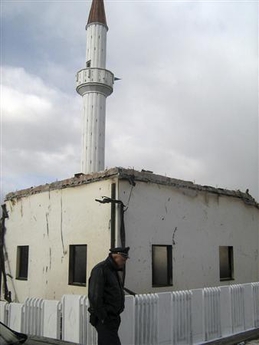
My friend Jasmin Caucevic, from the blog Jasmin’s Heart, asked me to write something about the mosque that was arsoned in the village of Fazlagića Kula, in the east of Bosnia. This village belongs to the territory of the Serb entity of Bosnia, the Republic of Srpska.
The Mosque was set on fire during the night of 7 to 8 December, by ‘coincidence’ the day of Bajram.
The fact is that, if you make a quick google search, you will find other episodes of extremists’ violence in Bosnia-Herzegovina.
I have been in Bosnia three times and crossed eastern Bosnia twice by bus, on my way to Sarajevo. On my first trip, last year, I was impressed by the amount of damaged and arsoned houses. I was’t surprised, but still one thing is to read about it or watch it on documentaries, another is to see for myself . The war was over for more than a decade, but still there were so many signs. However, I also saw many newly built or recently restored Mosques. Their reconstruction is part of the efforts to reverse the effects of genocide.
The arson of this Mosque, which had been built in 2003, after the old one, centuries old, was destroyed during the war, is only the latest on a series of incidents that occur too frequently in ‘Republica of Srpska’ , in areas where displaced people are returning, such as grafitti spraying with racist or threatening messages, vandalism of monuments, threats, assaults, ransacking of returnee’s homes.
In this case, an anonymous phone call had been made some days ago threatening the president of the local medžlis, saying that someone was going to « massacre the ustaše and the balije and set Fazlagića Kula on fire ».
However, serious as these violent actions may be, they fit a wider pattern.
The Human Rights report of the Helsinki Committee for Human Rights in Republika Sprspka states:
This makes it a lot easier to understand how could such serious incident occur. There are clear signs of impunity towards whoever may want to intimidate the returnees.
Human rights activists are also targeted. In July, Branko Todorovic, Executive Director of the Helsinki Committee for Human Rights in Republika Srpska, and his family received death treats:
Branko Todorovic has received similar treats in the past. These are credible treats. In February 2007 Dusko Kondor, the founder and director of the human rights education section of the Helsinki Committee for Human Rights in Republika Srpska was shot dead on 22 February 2007 at the door of his apartment in Bijeljina. His daughter was also injured in the attack.
From these few informations, it is not difficult even for an accidental reader who may not even be able to point Bosnia on a map to realize that the Serb entity of Bosnia is a very oppressive place. Its moderate voices are repressed or even supressed, while relativism and appeasement of serbian nationalist in the West give its radical elements and fake moderates a sense of impunity that leads them to keep the project of Greater Serbia alive, as is the case of the systematic threat of secession by the ‘Republika srpska’ leaders.


Sarah, it has the unpleasant feel to me of something more than a random act of intimidation. It resembles the sort of “testing the water” outrage that gives you an idea how far you can go before before someone will intervene in order to make you stop.
that’s what i feel too, Owen.
Sarah, can I suggest you send this to HP?
Stu
Pingback: Global Voices Online » Bosnia & Herzegovina: The Burning of a Mosque
Pingback: 60 Years of Human Rights | Amila Bosnae
Pingback: Bosnia » Mosque arsoned in ‘Republika Srpska’. « CAFÉ TURCO
Sarah I would like to thank you once again for such a depth and understanding of the real issues of this area.
Thanks, JC, it’s really rewarding to have people like you reading and commenting on my blog, and very stimulating to interact with other blogs like yours, or Daniel’s Srebrenica Genocide Blog, or Amila’s. your feedback on my blog and your posts on your blogs are very important to me.
I concur with you and Owen; given the context of political events in Republika Srpska (i.e., Dodik “testing the waters” of international resolve), it seems likely that various extremist elements in RS society are trying to see exactly what they can get away with and how the local authorities will act.
yes, you know, in the context of places like serbia and even more in the case of ‘republika srpska’, I don’t believe in spontaneous acts.
Destruction of mosques and churches is probably the most disgusting crime after rape. I consider mosques and churches to be monuments of art and they must not be destroyed.
I meant “cultural monuments of art.” From a historical point of view, they are precious elements of human architecture.
Remember Budha statues in Afghanistan? They were destroyed and the humanity will never get them back…